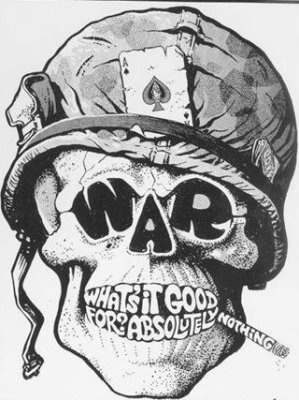Tags
AFR;, Art of War;, Australian Financial Review;, Beirut attack;, Deepak Chopra;, Edwin Starr;, Financial Times;, Lucy Kellaway, Motown;, Narcos;, Netflix;, Paris attack;, Paris killings;, Sun Tzu;, the Seven Spiritual Laws of Success;, war for talent;, war metaphor;, Whitfield and Strong;

In 1970 Edwin Starr recorded a song written by Norman Whitfield and Barrett Strong that was produced on the Motown label. It was a protest song written about the Vietnam War and was a huge hit worldwide. Despite being released 45 years ago, when it is played it still seems to resonate, partly I guess because war is something that persists and its value is still questionable. In recent weeks we have seen the outrage that terror brings from the Beirut attacks, the downing of the Russian airliner in the Sinai, to the Paris killings. A not surprising response to that has been the declaration of War against the perpetrators. Whether this is necessarily a bad thing is much more in the realms of a military strategist (which I’m not) to determine.
Rather I want to talk about the over-use of the word ‘war’. When you over-use a word it takes the sting out of it. For example the ‘F’ bomb is now so frequently peppered into modern parlance that it’s shock value has diluted. We have the war on terror, the war on drugs, war on crime, war on cancer, the war on want, the war on poverty and the war for talent to name but a few. I suspect that the use of ‘war’ as a metaphor is deployed for a number of reasons:
- It suggests we’re really serious about things now. After all no-one goes to war lightly;
- It suggests a real sense of campaign and co-ordinated planning. No-one can win a war unless all military resources are effectively deployed;
- It also suggests casualties. In order to prevail, sacrifices will need to be made but the greater good is more important;
- It suggests an enemy with less moral authority than us (although they are saying the exact same thing on the other side).
So, straight away, the word ‘war’ starts to seem inadequate at best or inappropriate at worst in most situations. Take drugs for example. I’ve been watching the excellent Netflix series Narcos and it is clear that the whole drug trade is a complex web of competing or coinciding interests and not as straight-forward as say fighting the Hun. Outside of the horror of a conventional battle between two nations (the true definition of war) everything gets a lot more fuzzy. The war on cancer is surely an oxymoron. To kill is the mechanism by which wars are won. The war on cancer is presumably to save lives. Same applies to want or poverty…indeed quite a lot of the want is a by-product of the various wars being raged from time to time be it in Africa or in the Middle-east at present.
The greatest ‘distortion’ of the word ‘war’ has to be the much used term now for getting and retaining your valuable staff. As if the words ‘attracting and retaining our valuable staff members’ is not emphatic enough, the phrase ‘the war for talent’ is being used in its place. It’s faddy, it’s inaccurate and it’s just plain wrong. As Lucy Kellaway in her recent column in the FT and AFR pointed out – where is the enemy? When I went to business school it was very trendy (and may still be) to quote Sun Tzu (The Art of War) as a short-cut solution to managerial problems. To confront and solve your managerial challenges armed with a copy of said tome is not that helpful. Let me quote.
‘The best leadership destroys the enemy’s plan.’ Not sure Harvard Business Review would concur and they bang on about leadership a lot.
‘Next best is to destroy their alliances.’ Once again not so sure. Maybe better to look at being smarter, leaner and more responsive.
‘After that comes the destruction of his army in the field.’ Hmmmmm.
‘Worst of all is to attack fortified cities.’ I’m with you there big fellah!
On first read that sounds like military strategy and not of great help to a manager, say, grappling with the reputational damage of a failed tailings dam in Brazil (a la BHP Billiton and Vale). It’s time we put the war books and war references down and looked to other avenues, softer ones perhaps, that might speak to how we can get really good people to join us and then stay with us – once known euphemistically as the loyalty effect.
Of course being the ‘naysayer’ and the ‘anti-guy’ can always be seen as easy. My critics might pose a tougher question and demand that I come up with some suggestions of my own. So here goes. Let me play devil’s advocate and address some ‘War for Talent’ issues.
from The Art of War: ‘Train the people (talent). Discipline them (the talent). They (the talent) will submit.’ …awkward!
from The Seven Spiritual Laws of Success (Deepak Chopra): ‘And when we realise that our true Self is one of pure potentiality, we align with the power that manifests everything in the universe.’
To offer the potential to truly grow and truly create has to be much more alluring than some borrowed and distorted tactics translated across from the theatres of war. Recent events have taught me one thing. We need to be kinder, gentler and more forgiving to ourselves, our team members and our community because there is enough of the other stuff happening out there to go around without adding to the mix. Let’s end poverty and want, let’s cure cancer, let’s solve the drug scourge and let’s all get talented individuals to join our teams because we will support them, nourish them and sometimes even let them go to grow. The last thing anyone in their right mind would want to do is place them anywhere near a ‘war zone’ in whatever shape or form.
